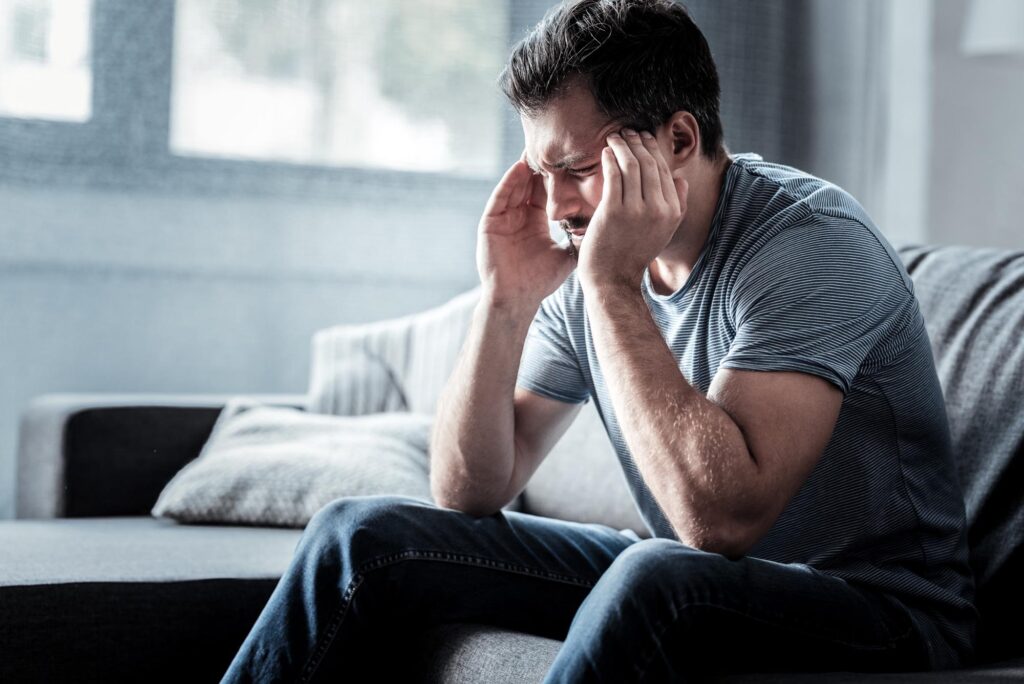Benzodiazepines are important medications for millions of people dealing with anxiety disorders, insomnia, and seizure conditions. When prescribed and used correctly under medical supervision, these powerful sedatives can provide genuine relief. However, Benzodiazepine’s calming effects can slowly change from helpful ally to silent captor.
The path from prescribed medication to dependency often happens so gradually that many individuals find themselves questioning their relationship with these drugs long after addiction has taken hold. Physical tolerance builds quietly, emotional reliance deepens, and what once brought peace begins demanding more to deliver the same comfort.
By recognizing the early warning signs of benzodiazepine addiction, you can intervene before the grip tightens beyond comfortable reach. Your awareness of potential dependency patterns empowers you to seek help while recovery remains most accessible.
This article highlights five important signs that may indicate benzodiazepine addiction. It offers you a compassionate perspective through which to examine your own experience. Understanding these markers is the first step toward reclaiming control and building a life of genuine peace.
What Are Benzodiazepines?
Benzodiazepine medications are a type of prescription drug that work by increasing the effects of gamma-aminobutyric acid (GABA), a neurotransmitter that naturally calms brain activity. These medications slow down the central nervous system, creating feelings of relaxation and reducing anxiety, muscle tension, and seizure activity.
Healthcare providers commonly prescribe several types of benzodiazepines, each with different onset times and durations:
- Xanax (alprazolam) – fast-acting, typically prescribed for panic disorders
- Ativan (lorazepam) – intermediate-acting, used for anxiety and pre-surgical sedation
- Valium (diazepam) – long-acting, prescribed for anxiety, muscle spasms, and seizures
- Klonopin (clonazepam) – long-acting, commonly used for panic disorders and seizures
- Restoril (temazepam) – intermediate-acting, primarily prescribed for insomnia
These medications function as both sedatives and anxiolytics, meaning they produce calming effects while reducing anxiety. The brain’s GABA receptors become enhanced when benzodiazepines bind to them, creating a powerful sense of tranquility that can provide significant relief for those struggling with anxiety disorders, sleep disturbances, or seizure conditions.

Do I Have Benzodiazepine Addiction?
Benzodiazepine addiction, clinically recognized as Sedative, Hypnotic, or Anxiolytic Use Disorder in the DSM-5, occurs when someone continues using these medications despite experiencing significant impairment in their daily life. The diagnostic criteria include patterns of problematic use leading to distress or functional problems, manifesting through symptoms like tolerance, withdrawal, unsuccessful attempts to cut down, and continued use despite physical or psychological consequences.
Several risk factors increase vulnerability to developing benzodiazepine dependency:
- Genetic predisposition – Family history of substance use disorders creates heightened susceptibility
- Trauma history – Past experiences of abuse, neglect, or significant life events often drive self-medication behaviors
- Environmental influences – Chronic stress, social pressures, and easy access to medications
- Co-occurring mental health conditions – Anxiety disorders, depression, and PTSD frequently co-exist with benzodiazepine misuse
- Duration of use – Extended prescription periods, even when medically appropriate, can lead to physical dependence
Understanding these factors helps individuals recognize their personal risk profile and seek appropriate support when concerns arise about their relationship with these medications.
Recognizing these signs in yourself can be frightening, but you are not alone. Contact our compassionate team at Magnolia Ranch Recovery for a confidential assessment to understand your options.
Signs You May Be Addicted to Benzos
Recognizing the warning signs of benzodiazepine addiction requires careful attention to changes in your body, behavior, and mental state. These medications create subtle yet profound alterations that often develop gradually, making them easy to overlook or rationalize. Understanding these indicators empowers you to seek help before addiction deepens its hold on your life.
1. Physical Symptoms
Your body provides clear signals when benzodiazepine dependence takes root. The most noticeable physical manifestations include:
- Persistent weakness that doesn’t improve with rest
- Excessive drowsiness even after adequate sleep
- Poor coordination affecting daily activities like walking or driving
- Blurred vision that interferes with reading or focusing
Neurological Impact Indicators
These are signs that indicate an impact on your nervous system:
- Tremors in hands or other body parts, particularly when the medication wears off
- Frequent headaches that seem unrelated to other health conditions
- Memory problems ranging from forgetting recent conversations to losing track of time
- Difficulty concentrating on tasks that were previously manageable
These physical symptoms represent your nervous system’s adaptation to regular benzodiazepine presence. When your brain becomes accustomed to the medication’s sedating effects, it struggles to function normally without chemical assistance. The tremors and coordination issues reflect your central nervous system’s compromised ability to regulate movement and balance.
Memory problems deserve particular attention, as they often signal deeper neurological changes. Many people experiencing benzodiazepine addiction report feeling mentally “foggy” or disconnected from their surroundings. This cognitive dulling can affect work performance, relationships, and personal safety.
The severity of these physical symptoms typically correlates with the duration and dosage of benzodiazepine use. However, even prescribed therapeutic doses can produce these effects when taken consistently over extended periods, highlighting the importance of monitoring your body’s responses to these powerful medications.
2. Behavioral Symptoms
Benzodiazepine addiction shows up through specific changes in behavior that often develop slowly, making them hard to notice at first. These patterns are your body’s and mind’s way of reacting to chemical dependence, creating strong urges that can overpower logical thinking.
Escalating Cravings and Tolerance
The most noticeable behavioral sign is having intense cravings for your benzodiazepine medication and needing higher doses to feel the same calming effects. What used to work with one pill now requires two or three, indicating that your body is getting used to the medication.
Medication-Seeking Behaviors
Commonly known as “doctor shopping,” this behavior involves visiting multiple healthcare providers to get more prescriptions. You might find yourself hoarding pills, counting them obsessively, or feeling panicked when your supply runs low. These actions often go hand in hand with elaborate stories or exaggerated symptoms presented to medical professionals.
Life Disruption Patterns
Your responsibilities at work, home, or school start taking a backseat to maintaining your benzodiazepine use. Social relationships suffer as you withdraw from family gatherings, cancel plans with friends, or avoid situations where your medication use might be questioned or unavailable.
3. Psychological Symptoms
The psychological impact of benzodiazepine dependency extends far beyond the physical realm, creating profound changes in mental and emotional functioning. These psychological symptoms often develop gradually, making them particularly challenging to recognize in the early stages of addiction.
Mood Instability
Mood instability becomes a hallmark of benzodiazepine dependency. Individuals frequently experience intense irritability, especially when their medication begins to wear off between doses. This irritability can escalate into explosive anger over minor inconveniences or perceived slights. Paradoxically, anxiety levels may actually increase when not using benzos, creating a vicious cycle where the very condition the medication was prescribed to treat becomes worse without it.
Cognitive Impairment
Cognitive impairment manifests as severely compromised judgment and decision-making abilities. Simple choices that once felt automatic—like whether to drive after taking medication or how to handle work responsibilities—become overwhelming or result in poor decisions. Memory formation suffers significantly, with individuals struggling to retain new information or recall recent conversations and events.
The psychological grip of benzodiazepine addiction creates a mental fog that clouds rational thinking, making it increasingly difficult to recognize the extent of the problem or make sound choices about treatment and recovery.
4. Withdrawal Symptoms
Benzodiazepine withdrawal is a clear sign of addiction, showing how dependent the body has become when the medication is reduced or stopped. These symptoms occur as your nervous system struggles to work without the soothing effects it has become used to.
Initial Withdrawal Symptoms
The first signs of withdrawal usually include:
- Anxiety and panic attacks that feel more intense than your original condition
- Severe insomnia lasting days or weeks, disrupting your natural sleep cycle
- Physical restlessness and an inability to feel comfortable in your own body
- Muscle tension and tremors throughout your limbs
Serious Medical Risks of Withdrawal
Benzodiazepine withdrawal poses significant medical dangers that set it apart from other substance withdrawals. The most severe complications include:
- Seizures that can happen unexpectedly, especially after stopping suddenly
- Heart problems such as rapid heartbeat and spikes in blood pressure
- In extreme cases, delirium tremens causing confusion and hallucinations
These withdrawal symptoms can last for weeks or even months, creating a cycle where individuals return to benzodiazepine use simply to escape the unbearable discomfort, reinforcing the addictive pattern.
5. Chronic Use Effects
Extended use of benzodiazepines creates profound changes in brain structure and function that can persist long after stopping the medication. The most concerning consequence involves significant cognitive decline, with memory formation becoming increasingly impaired as neurons struggle to function normally without the drug’s presence.
Research shows that prolonged benzodiazepine abuse significantly increases the risk of dementia, especially in older adults. The brain’s natural ability to form new memories deteriorates, while existing memories become harder to access. Users often experience:
- Short-term memory gaps that worsen over time
- Difficulty concentrating on simple tasks
- Reduced problem-solving abilities
- Impaired learning capacity
The hippocampus, responsible for memory consolidation, shows measurable shrinkage in chronic users. This neurological damage can take months or years to reverse, with some changes potentially becoming permanent. Benzodiazepine dependency literally rewires neural pathways, making the brain dependent on artificial chemical balance rather than producing natural calming neurotransmitters.
Processing speed slows dramatically, affecting work performance, relationships, and daily decision-making. These cognitive effects often compound other addiction symptoms, creating a cycle where impaired judgment makes recognizing the problem increasingly difficult.
What Are The Dangers of Benzodiazepine Abuse and Overdose?
Benzodiazepine abuse carries serious risks that extend far beyond the medication’s intended therapeutic effects. The most dangerous scenario occurs when individuals combine these medications with other central nervous system depressants, creating a potentially lethal combination.
Polydrug Abuse Risks
Mixing benzodiazepines with alcohol amplifies the sedative effects of both substances, dramatically increasing the risk of:
- Respiratory depression – breathing can slow to dangerous levels or stop entirely
- Cardiac complications – heart rate irregularities and potential cardiac arrest
- Severe cognitive impairment – confusion, disorientation, and loss of consciousness
- Accidental injuries – falls, accidents, and impaired motor function
Similar dangers arise when combining benzos with opioids, barbiturates, or other sedating medications.
Critical Overdose Warning Signs
Recognizing benzodiazepine overdose symptoms can save lives. Watch for these emergency indicators:
- Extreme drowsiness or inability to stay awake
- Shallow or labored breathing
- Blue lips or fingernails (cyanosis)
- Weak pulse or irregular heartbeat
- Confusion or unresponsiveness
- Loss of coordination or muscle control
These symptoms require immediate medical attention, as benzodiazepine overdose can quickly become life-threatening without proper intervention.
How Is Benzodiazepine Addiction Diagnosed and Treated?
Clinical diagnosis of benzodiazepine addiction follows the DSM-5 criteria for sedative, hypnotic, or anxiolytic use disorder. Healthcare professionals evaluate patterns of use, impaired control, social problems, risky behaviors, tolerance, and withdrawal symptoms occurring within a 12-month period. The severity depends on how many criteria are met, ranging from mild (2-3 symptoms) to severe (6 or more symptoms).
Medical supervision during detoxification remains critical for safe benzodiazepine withdrawal. The process requires gradual tapering under professional guidance to prevent potentially life-threatening complications like seizures or cardiac events. Abrupt cessation can trigger dangerous withdrawal symptoms that demand immediate medical intervention.
Psychological therapies form the foundation of long-term recovery success. Evidence-based treatments like Cognitive Behavioral Therapy (CBT) and Dialectical Behavior Therapy (DBT) help individuals develop healthy coping mechanisms and address underlying mental health conditions. Comprehensive aftercare planning ensures continued support through outpatient programs, support groups, and ongoing therapy sessions.
Magnolia Ranch Recovery’s Benzodiazepine Treatment Program
Our specialized approach begins with medically supervised detoxification across our serene 38-acre Tennessee facility. We provide:
- Comprehensive care continuum: Medical detox → Residential treatment → Intensive outpatient → Ongoing support
- Intensive therapeutic support: Up to three daily therapy sessions during withdrawal
- Evidence-based treatments: CBT, DBT, and trauma-focused therapies
- Holistic healing: Art therapy, yoga, and equine-assisted therapy
- 24/7 medical supervision: Ensuring safety throughout the entire process
If you or someone you know is in need of a rehab facility, we also offer guidance on how to choose the right rehab facility, ensuring that the transition into recovery is as smooth as possible.
What Are Prevention Tips for Benzodiazepine Dependence
Responsible prescription use is the key to preventing benzodiazepine dependence. Healthcare providers usually prescribe these medications for short-term relief, with most treatment plans lasting less than four weeks. By strictly following the prescribed doses and timelines, you can protect yourself from developing tolerance and physical dependence.
Key prevention strategies include:
- Follow prescribed dosages exactly – Never increase doses without medical consultation, even if symptoms persist
- Respect treatment duration limits – Most benzodiazepine prescriptions should not exceed 2-4 weeks for optimal safety
- Maintain honest communication with your healthcare provider about any concerns, side effects, or urges to increase dosage
- Avoid seeking multiple prescriptions from different doctors, as this practice increases overdose risk and masks developing dependency patterns
- Schedule regular check-ins with your prescribing physician to monitor effectiveness and discuss tapering strategies
Open dialogue with healthcare providers allows for early identification of potential dependency issues. Patients who experience persistent anxiety or sleep difficulties beyond the initial treatment period benefit from exploring alternative therapeutic approaches rather than extending benzodiazepine use. This proactive approach helps maintain the therapeutic benefits while minimizing addiction risks.
You Might Also Enjoy: Ways to Reach Out in Recovery
Taking The Next Step with Magnolia Ranch Recovery
Recognizing the signs of benzodiazepine addiction takes courage, and acknowledging your concerns represents the first meaningful step toward healing. If any of the symptoms or behaviors described in this article resonate with your experience, know that compassionate, professional support awaits you.
At Magnolia Ranch Recovery, we understand the unique challenges of benzodiazepine addiction and the delicate process required for safe recovery. Our private, secluded Tennessee facility provides the serene environment necessary for deep healing, while our medical team ensures your safety throughout every stage of withdrawal and recovery.
Your journey toward freedom from benzodiazepine dependence deserves personalized attention and expert care. Our low client-to-therapist ratio means you’ll receive individualized treatment that addresses not only your addiction but also any underlying conditions that may have contributed to your dependence.
Ready to reclaim your life? Contact Magnolia Ranch Recovery today for a confidential consultation. Our compassionate team is here to guide you through medically supervised detoxification, comprehensive therapy, and robust aftercare planning designed to support your lasting recovery.

FAQs (Frequently Asked Questions)
What are benzodiazepines and what medical conditions are they commonly prescribed for?
Benzodiazepines are a class of medications used primarily as sedatives and anxiolytics. They are commonly prescribed to treat anxiety, insomnia, and seizures, helping to calm the nervous system and induce relaxation.
How can I tell if I might be addicted to benzodiazepines?
Signs of benzodiazepine addiction include physical symptoms like weakness, drowsiness, poor coordination, and memory problems; behavioral symptoms such as intense cravings, increasing tolerance, doctor shopping, and social withdrawal; psychological symptoms including mood changes and impaired judgment; withdrawal symptoms like anxiety and insomnia; and chronic effects such as cognitive impairment.
What risks are associated with benzodiazepine abuse and overdose?
Benzodiazepine abuse carries significant risks, especially when combined with alcohol or other substances (polydrug abuse). Overdose signs include extreme drowsiness and respiratory depression, which can be life-threatening. Chronic misuse increases the risk of cognitive decline and severe withdrawal complications like seizures.
How is benzodiazepine addiction diagnosed and treated?
Diagnosis is based on DSM-5 criteria assessing symptom duration and frequency. Treatment involves medically supervised detoxification to safely manage withdrawal symptoms, followed by psychological therapies such as CBT or DBT. Comprehensive programs may include residential intensive treatment, outpatient care, holistic therapies like yoga or equine-assisted therapy, all tailored to support lasting recovery.
What prevention tips help avoid benzodiazepine dependence?
To prevent dependence, it is crucial to use benzodiazepines responsibly by strictly adhering to prescribed dosages and limiting use typically to under four weeks. Avoiding doctor shopping and maintaining open communication with healthcare providers about any concerns or side effects also reduces the risk of addiction.
How can Magnolia Ranch Recovery assist individuals struggling with benzodiazepine addiction?
Magnolia Ranch Recovery offers personalized benzo detox programs under medical supervision in a peaceful 38-acre ranch setting near Nashville. Their comprehensive treatment includes medical detoxification, residential and outpatient therapies, certified psychological treatments like CBT and DBT, holistic options such as art therapy and equine-assisted therapy, along with continuous professional support aimed at achieving long-term recovery.
You Might Also Enjoy: Dual Diagnosis: How Do I Know If I Need This Type of Treatment?


















